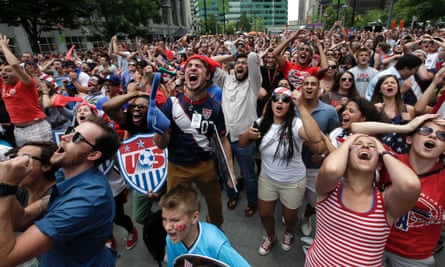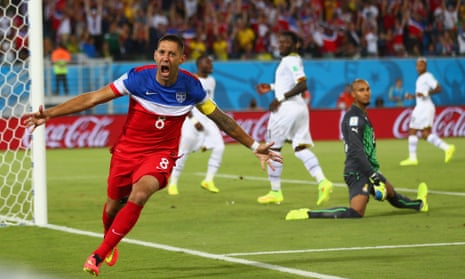Campus Martius in downtown Detroit was bustling. Professionals on their lunch break were joined by a thousand-strong crowd of soccer fans for the USA v Germany game. Unabashed, shameless patriotism mixed with a more localized, do-gooder kind of pride. One woman, little concerned with the handful of German supporters in the crowd, wore a shirt that read “back-to-back world war champs". Another woman's t-shirt announced “I bicycle Detroit.”
Soccer in Detroit is big. Young professionals are playing it. Kids in schools are being taught the game. Newly arrived Mexican migrants in the south-western part of town are finding a piece of home in it. A new minor league city soccer team, which has not yet turned three, draws over 3,000 spectators a match. Rumor has it even Mayor Duggan is pushing to have more of it.
But far from bringing the 82% African American city together, the different strands of soccer in Detroit have come to symbolize communities living very different realities, side-by-side.
The white neighborhood soccer leagues of Detroit
Soccer in Detroit has become an indicator of class and race, always thorny subjects in the Motor City. With an estimated 57% of children living below the poverty line, median household income at $23,600 in 2012, and soccer taking up little space in American black culture, Detroit may not seem like the home of choice for game. Detroit is repeatedly found to be the most segregated metro area in the country. Most Detroit suburbs are overwhelmingly white, with median household income often three, sometimes even four times what it is in Detroit.
Soccer is becoming a path to class mobility. Young kids in and out of Detroit public schools are being taught soccer as a way to compensate for the bankrupt city's cutting down on physical education programs, closing down of recreation centers and its lack of functional parks.
And newcomer adult white professionals, who are gentrifying Detroit, have – perhaps unwittingly – formed an almost entirely white neighborhood soccer league, with an accent on community building and giving back to the city.
Yet a trip to any Tuesday night game reveals hardly any adult African American Detroiters taking part. The few non-white people present tend to be foreigners, also new transplants to the city: Jamaicans, South Africans, Dominicans.

Alia Allen, a Wayne State University administrator in her 30s, captains a team in a popular local soccer league and has lived in Detroit her entire adult life after growing up in Holland, Michigan.
“My team doesn’t do great on diversity,” Allen admits sheepishly.
“Nowadays there’s a black Detroit and then there’s a white Detroit,” says 33-year-old Danny Voros, a participant in the adult recreational soccer neighborhood league who owns a manufacturing business outside of Detroit.
In the case of soccer, if the exclusion of black adult native Detroiters, uninterested in the sport, is unintentional, what does it mean for the city's future?
“What is interesting about the neighborhood league is that because of the segregation we have seen between Detroit and the metro area what it really ends up being is folks who are connected probably outside of Detroit, coming into Detroit and then determining the direction of Detroit,” says L’Heureux Lewis-McCoy, an associate professor of sociology and black studies at the City College of New York CUNY, who specializes in the study of inequality and is intimately acquainted with Detroit.
Black Detroit, white Detroit, and soccer
Investment, including in soccer programs, is pouring into those neighborhoods most seen as white – downtown, midtown, Corktown – and positive media representation is often only going to white success stories. Cultural gentrification is starting to show lines of stress.
It was visible at the USA-Germany game. At the heart of the crowd, a group of fans wrapped in the American flag, who had traveled to watch the game from the nearby suburb of Livonia, asked a man leaning against a barrier in front of them to move. The man first refused, but as the tone of the men behind him grew angrier and he was asked again, he conceded. Outnumbered by white soccer fans, the black guy seemed to know better than to let the situation escalate.
Soccer and the ladder to the middle class
In America, soccer is middle-class, Tim Richey, the CEO of the Detroit Police Athletic League, offers by way of explanation.
Richey, originally from the Detroit suburb of Southfield, had played soccer competitively for the Michigan Bucks. In 1996, as he tells it, he walked into the Jeffries housing projects in Detroit, with a bag full of soccer balls and a question: who wants to play?
Richey, “the only white guy in the projects,” had a few takers. He built a youth soccer league with hundreds of girls and boys across the city. Today, about 2,000 Detroit children annually participate in some form of soccer training with Detroit PAL. Half of them come through a public school specific program backed by the US Soccer Foundation, which is keen to reach underrepresented, urban populations.
De Kimble, now 26, was one of the children originally recruited by Richey in the projects. It was a somewhat rocky beginning. Kimble was accustomed to adults who came to Detroit to help rarely sticking around later.
“You’re going to be gone before me, anyways,” Kimble said to Richey one day shortly after the program had kicked off, refusing to join practice.
Richey kept on coming back, and Kimble kept up the soccer. Today, Kimble – a talented player who had to go to the suburbs as a teenager to find a team high enough in level - credits the game with keeping him out of trouble, out of drugs and in school.
Predictably, while playing in the 92% white suburb of Birmingham, Kimble was the only black player on the team, he says.
The American pay-to-play model for soccer
Regardless of race, going to the suburbs and climbing up the soccer league ladder remains a dream for most kids – however talented they turn out to be. In the United States, the better you get at soccer and the higher up the leagues you want to climb, the more your parents have to pay. If they can’t pay, your chances of going pro, or even getting to go to college on a soccer scholarship, are slim.
“Soccer in the United States is a pay-to-play model,” says James Tyers, a British soccer coach and former professional player based in Detroit. Tyers estimates parents with kids who want to play soccer seriously would be expected to put in around $50,000 over the course of 10 years, with no guarantee of return on investment.
This is a far cry from what Tyers went through himself. Growing up on a council estate – the British equivalent of housing projects – in Norfolk, England, Tyers says soccer is what got him out of poverty. Soccer, in other words, paved the way for upward social mobility, rather than being the symbol of class entrenchment.
Detroit's young professionals and soccer as part of the city's rebirth
With America’s soccer demographics so clear, it is probably unsurprising that it became the sport of choice for the white young professionals, heading back into the city many of their parents deserted decades ago in what has become referred to as “white flight.”
Sean Mann, 33, grew up in Livonia and in 2009 scored a big real estate deal: he bought his large house in the Detroit neighborhood of Hubbard Farms for $79,000. It struck him that people in neighborhoods around the city needed a way of coming together that was fun, helped economic development and created a sense of community.
Shortly after reaching out to friends in various Detroit neighborhoods he referred to as “connectors,” Mann, who currently works as a lobbyist in Michigan’s capital, Lansing, created what is now referred to as the Detroit City Football League.
In its first year, the league had 11 teams – taking on various neighborhood names - taking part, with a total of 300 players. Four years later, the league includes 34 teams and 1,200 participants.
Mann, whose passion for soccer was consolidated while in grad school at Bristol University in England, says an insider survey showed at least 50 people had moved into Detroit from the suburbs because of the football league. On top of attracting new people to town, Mann says the neighborhood league has been the source for “countless” new initiatives, new professional relationships and associations.
Teams are encouraged to give back, having to complete one community-based activity – such as boarding up houses, or volunteering at the DIA - in order to qualify, and gain extra points throughout the season for any extra activity they undertake. Every Tuesday night, games are followed by a meetup at one of Detroit’s many bars.
To the participants, the neighborhood soccer leagues are part of the revitalization of Detroit.
“Here’s a scoop,” says Alia Allen, one of the team captains in Mann's league. “My parents are moving back to Detroit. They are moving into Lafayette Park and my dad wants to join the soccer team there.”
Allen’s parents are not alone. Mann’s parents recently moved into Detroit too.
The league’s focus is on improving the city of Detroit. Teams are allowed a maximum of five non-Detroit city residents on their teams, which average just over 30 players.
More residents, especially of a higher earning caliber, is a promising phenomenon in the Motor City, which has been hemorrhaging people for years and desperately needs a higher tax base to help it redress its dire financial affairs and underfunded public institutions.
Still, if soccer is a uniting force for the gentrification of Detroit, the issue of exclusion can still rankle for those who wonder what will happen to the black, adult Detroiters for whom soccer is an alien phenomenon.
“We think of discrimination, we think of racism, we think of exclusion as intentional acts," says Lewis-McCoy, the City College professor. "We think of them as ‘if I don’t like you, I don’t invite you.’ Oftentimes, in the contemporary United States, what exclusion looks like is not thinking about the person who you don’t ask.”
“If you want to do good, you have to create something good, but also look at the blind spot. And the question of why that blind spot exists is the challenging one,” says Lewis-McCoy.
To the city's newcomers, building a stable base of professional residents and a network to rebuild the city seems to be the priority.
“When I was biking around in 2005 and 2006 in Detroit, I never saw anyone else biking around, except out of necessity. One or two years after the soccer league started, that started changing,” says Danny Voros, who moved to Detroit in 2005 and like many others credits part of Detroit’s renewed appeal to young, white professionals with the soccer league.
“People used to move to the city and then get tired of it and then move away. That’s no longer happening.”








Comments (…)
Sign in or create your Guardian account to join the discussion